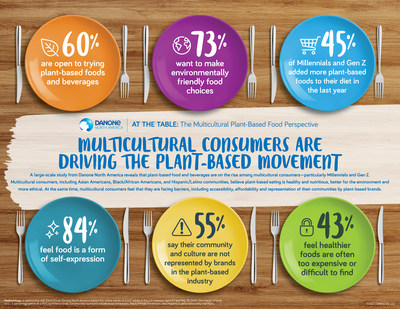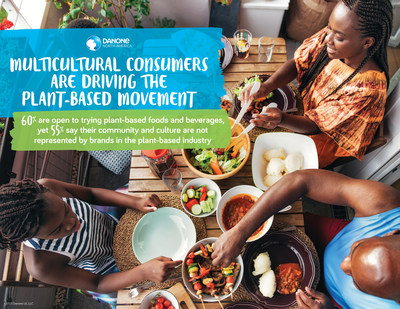WHITE PLAINS, N.Y. and BROOMFIELD, Colo., Dec. 8, 2021 /PRNewswire-HISPANIC PR WIRE/ — Danone North America, a purpose-driven company and a category leader in plant-based food and beverages with brands such as Silk® and So Delicious®, today released new research exploring the relationship between multicultural audiences and plant-based products. Understanding that food plays a defining role in multicultural consumers’ lives and is seen as a form of self-expression, Danone North America embarked on this research to learn from different multicultural communities about their interest in plant-based eating, how younger generations are adopting flexitarian lifestyles, what cultural stigmas they may experience, and how the industry can better reflect their culture in everything from marketing to innovation.

At the Table: The Multicultural Plant-Based Food Perspective, a survey of more than 4,000 adults in the U.S. including Asian Americans, Black/African Americans, and Hispanic/Latino communities, found that plant-based eating is on the rise among multicultural audiences, especially the younger millennial and Gen-Z populations. While the popularity of plant-based foods has exploded and multicultural audiences are a driving contributing force to the movement, this research also uncovered gaps in how much multicultural consumers can truly embrace plant-based diets as they feel that plant-based offerings are less attainable due to cultural stigmas and accessibility barriers.
“Plant-based eating has the potential to be a real beacon of healthy living, especially for diverse communities. To hear that multicultural audiences are more willing to add plant-based foods into their diets was personally inspiring and affirming to me, as my family and many friends have adopted flexitarian lifestyles over the last few years. With this research and the breadth of our product portfolio, the ability to help move Danone North America and the plant-based industry forward is one of the biggest reasons why I joined the company,” said John Starkey, President of Plant-Based Food & Beverage for Danone North America, “We’ve made a conscious effort to be more inclusive and reach underrepresented communities, particularly through our Silk and So Delicious brands, which have a long legacy in the plant-based space. Yet, there is still a lot of work to be done in understanding how different communities are experiencing plant-based food and beverages and how we can do more to engage and appeal to multicultural consumers, from our innovation choices and marketing efforts to our community impact work and sustainability strategies.”
Key findings and statistics from Danone North America’s At the Table: The Multicultural Plant-Based Food Perspective:
Multicultural Consumers Play a Significant Role in Driving the Plant-Based Movement
- Multicultural audiences are more willing than the total population to add plant-based foods into their diets as a substitution for animal products, with younger millennials and Gen Z consumers leading the charge.
- 71% of Asian Americans, 55% of Black/African Americans and 61% of Hispanic/Latino respondents say they “strongly” or “somewhat agree” that they are open to substituting the current foods they eat with plant-based alternatives compared to less than half of total population respondents (49%).
- Nearly 9 out 10 (84%) multicultural respondents say food is a form of self-expression, compared to 79% of Total Population. (Breakdown: 82% Hispanic/Latino, 80% Black/African American, and 91% Asian American.)
- Nearly three quarters of multicultural respondents (73%) say they ‘strongly or somewhat agree’ that they try to be environmentally friendly with their food choices but sometimes don’t have the information they need.
Multicultural Audiences Report Multiple Barriers to Plant-Based Adoption
- While multicultural audiences are making up an increasing share of the plant-based market, research revealed that overall, they feel less represented and less engaged by plant-based food brands.
- More than half of (55%) respondents say their community and culture are “not that well” or “not at all” represented by plant-based food companies and brands including 58% of Hispanic/Latino, 52% of Asian Americans, and 60% African American/Black respondents. The numbers are even higher among in the Gen-X and Baby Boomer generations within these communities.
- More than half of Hispanic/Latino (56%) and Black/African American (51%) respondents “strongly” or “somewhat agree” there is a stigma in their culture around people who eat plant-based foods.
- Multicultural respondents feel some healthier or more nutritious foods are less attainable due to barriers of affordability and accessibility. 48% of Asian Americans, 42% of Hispanic/Latino and 40% Black/African Americans also say they see plant-based foods as more expensive.
At the Table: The Multicultural Plant-Based Food Perspective further highlighted that multicultural audiences believe plant-based eating is healthy and nutritious, better for the environment, and more ethical. Multicultural consumers are looking for more plant-based companies and brands to engage with in a deeper and more meaningful way, not only through marketing efforts, but also through ingredient choices, education, and sustainability work.
Danone North America is committed to listening to and learning from multicultural consumers, and it shares this research with the industry in hopes of driving more inclusivity for this growing audience within the plant-based category. Armed with this research, Danone North America seeks to continue to understand the core values and drivers for multicultural consumers to inspire more meaningful relationships. Moving into 2022, the company is looking to take further action, expanding its inclusive marketing and customer efforts through new internal and external partnerships which range from sales and marketing to nutrition, innovation and more.
“At Danone North America, we believe making progress toward a more inclusive, just, and diverse culture is an essential part of using our business as a force for good. Our commitments to Inclusive Diversity are put into action through a strategy that focuses on four major areas – our people, the marketplace, community engagement and advocacy, for a number of topics that demonstrate our support for racial equity and social justice,” said Terrance Irizarry, Head of Inclusive Diversity for Danone North America. “Marketing efforts for our portfolio should reflect the diversity of our consumers and society—and also reach those consumers meaningfully. Conducting this important research on behalf of our plant-based portfolio is a huge step forward in listening, learning and ultimately taking action. It’s also part of our larger journey and work toward enhancing the overall diversity in our content and our partnerships with diverse suppliers in the industry.”
While the company continues to learn and refine its efforts of inclusivity, Danone North America is proud of the initiatives it has taken to meaningfully create change by better supporting, reflecting and including diverse communities. For example, Silk and So Delicious have focused on diverse representation within its talent pool and influencer marketing efforts, provided financial support for key African American and Asian American foundations, and advocate for social and economic empowerment of their farming partners across the supply chain, leading with coconut farmers in Southeast Asia.
Danone North America is committed to making plant-based options available and accessible for all, in line with its purpose to bring health through food to as many people as possible. For more information on the company and its plant-based food and beverage products, please visit www.danonenorthamerica.com.
Survey Methodology
In partnership with Zeno Group, Danone North America fielded this online survey of 4,027 adults in the US between April 27 and May 19, 2021. The margin of error is +/- 3 percentage points at a 95% confidence level.
About Danone North America
Danone North America is a purpose-driven company and an industry leader in the food and beverage category. As a Certified B Corporation®, Danone North America is committed to the creation of both economic and social value, while nurturing natural ecosystems through sustainable agriculture. Our strong portfolio of brands includes: Activia®, DanActive®, Danimals®, Dannon®, evian®, Happy Family® Organics, Honest to Goodness®, Horizon® Organic, International Delight®, Light + Fit®, Oikos®, Silk®, So Delicious® Dairy Free, STōK™, Two Good®, Wallaby® Organic and YoCrunch®. With more than 6,000 employees and 16 production locations across the U.S. and Canada, Danone North America’s mission is to bring health through food to as many people as possible. For more information, visit www.danonenorthamerica.com. For more information on Danone North America’s B Corp™ status, visit: https://bcorporation.net/directory/danone-north-america.
Press Contacts:
Nancy Fishgold
Danone North America
[email protected]
Natalia Lopez
Zeno Group
[email protected]


Photo – https://mma.prnewswire.com/media/1704531/Danone_Multicultural_Plant_based_Movement_Survey_1.jpg
Logo – https://mma.prnewswire.com/media/1704529/Danone_Logo.jpg
SOURCE Danone North America







